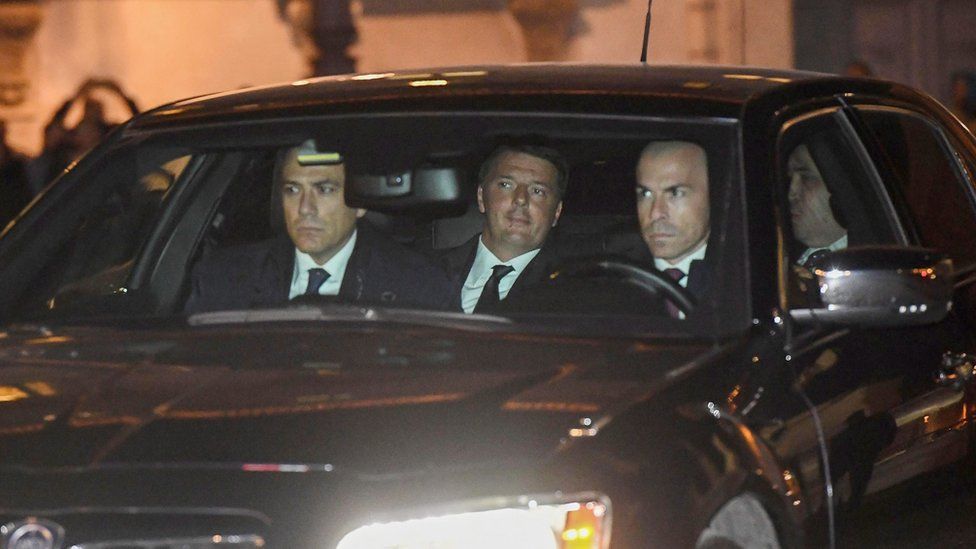Italy's Renzi hands in resignation amid political turmoil
- Published

Prime Minister Matteo Renzi has handed in his resignation to Italy's president, three days after losing a referendum he had staked his career on.
He had promised to wait until the Senate passed the 2017 budget, which it did earlier in the day.
President Sergio Mattarella will start consultations with political parties over forming a caretaker government at 18:00 (17:00 GMT) on Thursday.
In the meantime, Mr Renzi is to act as a "caretaker prime minister".
The consultation, which is due to end on Saturday afternoon, will look at where support lies for a new government, a presidential aide, Ugo Zampetti, told reporters on Wednesday.
According to Reuters, Mr Mattarella is expected to ask a member of Mr Renzi's cabinet, or a politician from his Democratic Party (PD), to try to form a new government.
However, some are calling for the election, due in 2018, to be called early.
Italians voted on Sunday by a margin of 59% to 41% against Mr Renzi's plans for constitutional reform, prompting his decision to stand down.
The BBC's James Reynolds in Rome says Mr Renzi may have stood down as prime minister, but he still wants to stay on the frontline of politics.
He remains the leader of the biggest party in parliament, the PD, and will play a considerable role in suggesting the name of his replacement.
Before heading to the Quirinale presidential palace, Mr Renzi told the PD it should only participate in a "government of national responsibility" if it has the support of the other political parties.
Otherwise, he said, "the PD is not afraid" of early elections.
Two of the big winners in Sunday's referendum, the anti-EU Northern League and anti-establishment Five Star Movement, are pushing for early elections.
But other parties, such as the centre-right Forza Italia, are trailing in the polls and want elections delayed. Forza Italia leader Silvio Berlusconi, 80, had tests in a Milan hospital on Wednesday, six months after he had heart surgery.
Names suggested as a possible leader of a new administration include PD Finance Minister Pier Carlo Padoan and Senate leader Pietro Grasso, who is apolitical.
According to a source quoted in Italy, President Mattarella believes it is "inconceivable" that elections can be held before electoral laws governing both houses of parliament are synchronised.
The law was changed to the so-called "Italicum" system last year to give the leading party a parliamentary majority through bonus seats in the lower Chamber of Deputies. But there has been no such change in the Senate, which is elected by proportional representation.
Senate reforms were part of the package rejected on Sunday. Another factor is that the constitutional court will rule on 24 January on whether the lower house reforms are legitimate.
Italy's political turmoil has also led to days of uncertainty in international markets, amid questions over the fate of Italy's indebted banks, especially its third largest, Monte dei Paschi, which is seeking €5bn (£4.2bn; $5.3bn) to recapitalise.
The markets moved higher and Italy's government bond yields fell on Wednesday amid reports that the government in Rome was preparing to take a €2bn controlling stake in the bank and to ask for a €15bn eurozone loan to bail out the troubled banks.
- Published7 December 2016
- Published5 December 2016